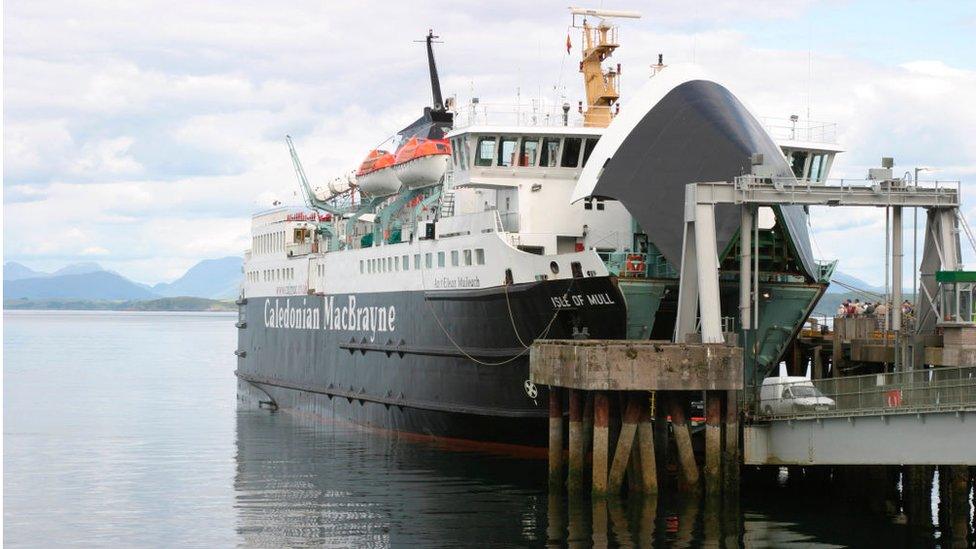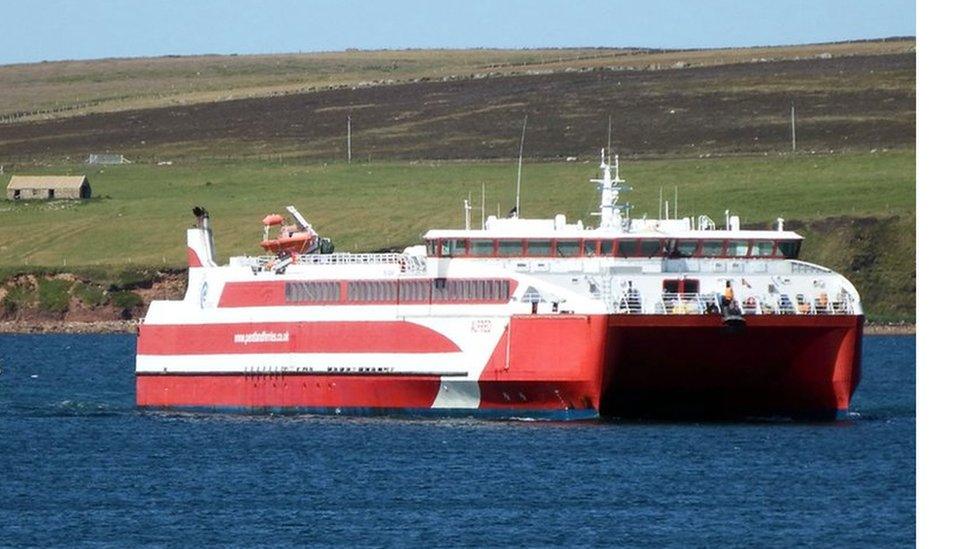Islanders consider running their own ferry service
- Published

Craignure is currently served by the 34-year-old CalMac ferry MV Isle of Mull
Islanders who are frustrated at the unreliability of CalMac ferries are looking to set up their own service.
Mull and Iona Ferry Committee (MIFC) is considering a community-owned alternative to the service provided by the state-owned ferry operator.
The group believes catamarans and shore-based crewing could offer a better service at far less cost to the taxpayer.
Highlands and Islands Enterprise has given £15,000 for a feasibility study.
MIFC has long been critical of the services provided by CalMac and CMAL, the government ferries agency which owns the ships and many west coast harbours.
MIFC chairman Joe Reade said: "Hebridean ferry services are some of the most inefficient, wasteful and high cost in the entire world."
The group argues the existing decision-making process is too centralised and officials are unwilling to embrace alternative viewpoints for improving the main Oban to Craignure route.
"CMAL have an obsession with making each ferry larger than the one before, which in turn requires millions to be spent 'upgrading' piers," Mr Reade said.
"Each one of those expensive vessels runs with twice the number of crew compared with international best-practice, as well as being hugely fuel-thirsty. Rather than protecting the failing status quo at huge cost, we should modernise both our vessels and our working practices."
What would the ferry group do differently?
The ferry group is in favour of having shore-based crews which it says would benefit the islands' economy and allow for a shift system, which in turn could enable longer operating hours.
CMAL's preference is for ships with on-board accommodation for all the crew, which it argues is good for resilience if a ship has to divert due to bad weather or has to be redeployed across the ferry network.
The island ferry group is also in favour of smaller ships with fewer crew numbers - but a greater frequency of sailings. The committee argues a similar number of seafarers would be employed overall.

The catamaran MV Alfred is currently operated in the Pentland Firth by a private company
In particular, it wants to explore the idea of using catamarans, similar to ones that have for many years provided ferry services across the Pentland Firth.
Supporters of catamarans say they provide high car-carrying capacity and fuel efficiency at a far reduced cost when compared with the traditional mono-hulled ships favoured by CMAL.
CMAL remains sceptical about the suitability of catamarans for the west coast routes. It is in favour of standardising the CalMac fleet, with two 95m mono-hulled ferries currently built for the Islay route, and two more soon to be ordered for the Skye/North Uist/Harris routes.
The 'unbundling' debate
The MIFC proposal would require the Oban Craignure route to be "unbundled" from the main CalMac ferry service.
The committee acknowledges this would need government support, as it would make no sense to compete directly with CalMac, and a community-run service would still require government subsidy to be viable.
Supporters of unbundling say that splitting the 25 routes in the Clyde and Hebridean Ferry Service contract into smaller chunks would encourage competition and lead to more innovative solutions. They point out that Norway, which has an extensive ferry network, takes a far more decentralised approach.
The counter argument is that having a single large contract offers economies of scale, and better resilience as the operator can swap vessels around routes when a problem arises.
The Scottish government recently published a review of ferry services, called Project Neptune, but has ruled out unbundling.
The current CalMac contract runs until 2024 although it remains unclear whether following Brexit there will be a requirement to re-tender the routes in the same way.
Transport Scotland said it did "not recognise" some of the criticisms being made by the island ferry committee.
A spokesperson added: "Scottish ministers have been clear on multiple occasions, including the transport minister's recent update to parliament on Project Neptune, that we will not consider splitting up the network or privatisation of any of the Clyde and Hebrides Ferry Services routes."
CMAL insisted its decision making was informed by "extensive community engagement, forecasting and future proofing".
In a statement it said: "We have a professional team of engineers, ship designers and naval architects who have extensive experience of the scope and limitations in delivering complex engineering solutions suitable for the operating conditions in Scotland."
MIFC hopes to have a feasibility study for its plan completed by the end of February next year, after which a consultation would be carried out to gauge local support.